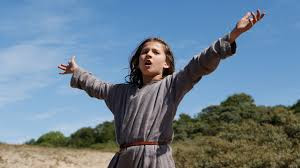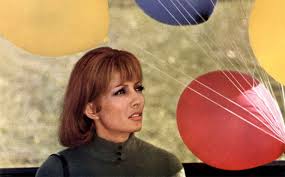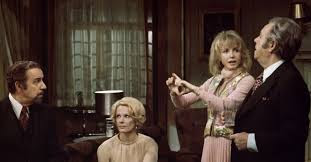 |
| Here we go loop de loo: Bruno Dumont's Jeanette... |
Bruno Dumont's Jeanette: The Childhood of Joan of Arc is one of the oddest films to come down the pike in quite some time. In this umpteenth film about Joan, Dumont has the gumption to stage Joan's youthful philosophical struggles as a rock opera. The film often borders on ludicrousness, but I was won over by its crazed intensity and singularity of vision. Working with an amateur cast, Dumont illuminates Joan's quest to work for God's grace in a world beset by evil. The musical numbers startlingly evoke Joan's devotional quest. A film that teeters on the edge of disaster, Jeanette ultimately worked for me because Dumont and his cast are utterly committed to Joan's plight.
Eschewing the trappings of conventional musicals, Jeanette eerily resembles the work of Bresson in its utilization of non-actors, its deceptively simple cinematic technique, its naturalized settings and its unabashed invoking of religious fervor. Dumont also employs closeups, as did Bresson, to stress the restraints to and freedom of man's will in the temporal sphere. Both actresses who play Joan give their all and it is this emotional directness that many viewers will find off-putting, but I found refreshing.
Jeanette is a crude film in many respects: choreography, cinematography, the acting, etc., etc. A number of critics have seized upon the amateurish nature of the film to deride it as a catastrophe. The root of the word amateur is, of course, the Latin word for love and I think this is a clue to Dumont's intentions. He didn't want to make a gussied up super production about a medieval peasant girl who willed herself to sainthood. Dumont wanted to make a personal film stressing the humility and intensity of the saint and in this he has succeeded. I somewhat eagerly await the sequel. (1/4/19)



















